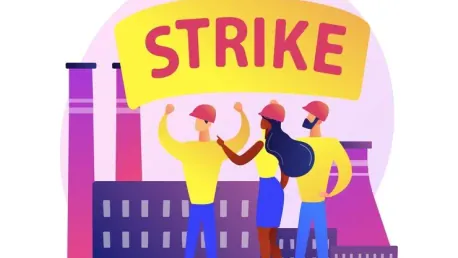A significant legislative proposal from Washington State intends to offer unemployment benefits to workers who go on strike to advocate for better pay and working conditions. This bill has already made considerable progress within the legislature, passing a crucial Senate vote by a narrow margin and receiving a favorable recommendation from the House Committee on Labor & Workplace Standards.
Unemployment Benefits for Striking Workers
Key Provisions of the Bill
If this bill becomes law, striking workers in Washington would be entitled to unemployment benefits after a two-week waiting period, with these benefits lasting no more than 12 weeks. This extends to workers who are locked out by their employers during labor disputes, a provision addressing situations similar to the recent Boeing firefighters’ lockout.
The bill addresses several critical concerns. Workers would have a financial safety net during their time on strike, significantly impacting their ability to maintain basic living standards and mitigate potential economic hardships. Those advocating for the bill, like Alexa Tapia from the National Employment Law Project, assert that providing such benefits aligns with the original intent of unemployment insurance. The insurance was designed to protect workers from unexpected income loss and unsuitable job conditions. States such as New Jersey and New York have implemented similar measures, offering a precedent for Washington’s proposal.
Perspectives from Supporters and Opponents
On the other side of the debate, opponents, including Lindsey Hueer from the Association of Washington Businesses, argue that unemployment insurance should exclusively assist workers who have involuntarily lost their jobs and cannot return to work. The opposition raises concerns about the potential financial burden on businesses, especially smaller entities that may struggle with the added costs of funding these benefits. Employers would need to cover the costs through an experience tax, with a wider cost-sharing mechanism only envisioned if they reach the system’s maximum rate class, which current fiscal projections suggest is an unlikely outcome.
During a House public hearing, various testimonies shed light on the financial struggles that workers endure during strikes. Individuals like Jan “Mikey” Abapo from the International Association of Machinists and Aerospace Workers provided personal anecdotes reflecting the difficult choices workers face between meeting basic needs and continuing to support their families during such challenging times. Their stories underscore the hardships and the need for a support system during labor disputes.
Financial and Economic Implications
Projections for the Bill’s Impact
The potential economic implications of the bill are also considerable. Should the bill pass, its provisions would be in place until December 2035, with lawmakers required to submit annual reports evaluating its impact. This ensures ongoing assessment and adjustments as needed, aiming for a balance between worker protection and business sustainability.
The bill could result in increased short-term costs for businesses. While the fears raised by opponents about these costs are valid, the structured evaluation periods and capped benefit durations indicate a careful approach to mitigate long-term financial impacts. As unemployment benefits would be limited to 12 weeks and only apply after the two-week waiting period, the immediate financial strain for businesses may be somewhat contained.
Comparative Analysis with Other States
Looking at other states that have implemented similar unemployment benefits for striking workers can offer insight into potential outcomes. States like New Jersey and New York have established frameworks that provide a reference for Washington. These states have seen positive impacts, including reducing the financial vulnerability of workers during strikes and ensuring that employees can exercise their right to strike without facing overwhelming economic hardship. The data from these states can inform Washington’s decisions as they move forward with the proposed legislation.
Path Forward for Worker Protection
Expected Legislative Outcomes
As the legislative process continues, the bill’s ongoing assessment period suggests a proactive approach to ensure its efficacy and financial sustainability. Annual reports from lawmakers will be instrumental in tracking the bill’s impact, offering opportunities to refine and adjust policies based on real-world outcomes.
The proposed bill represents a significant step towards greater worker protections in Washington State. It underscores a broader trend of enhancing labor rights and ensuring that workers have the necessary support to advocate for better working conditions without the immediate threat of financial ruin. By looking at other states with similar protections, Washington aims to craft a balanced, sustainable approach to unemployment benefits for striking workers, ultimately aiming to support and maintain a fair and equitable working environment.
Future Considerations and Actions
A notable legislative proposal emerging from Washington State aims to extend unemployment benefits to workers who strike for improved wages and working conditions. This measure represents a significant step in supporting labor rights and empowering workers to advocate for fair treatment without the immediate fear of losing income. The bill has already made notable strides within the legislative process. It successfully navigated a crucial Senate vote, passing by a slim margin, demonstrating both substantial support and contention. Additionally, it has received a favorable recommendation from the House Committee on Labor & Workplace Standards, signaling that the proposal is gaining traction. If enacted, this law would mark a substantial shift in labor support policy, offering financial security to workers who take the bold step of striking for their rights. The progress of this bill will be closely watched by both advocates of workers’ rights and those concerned with the broader economic implications.









